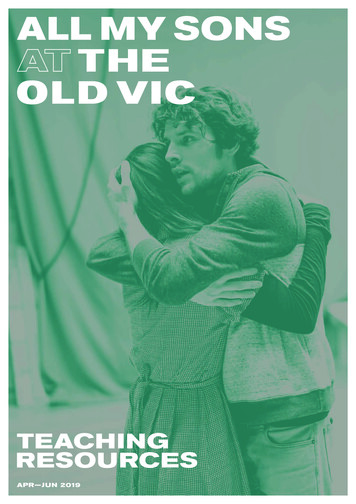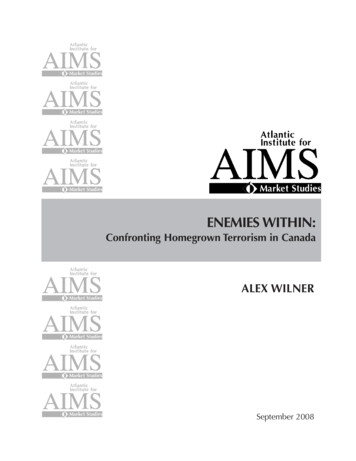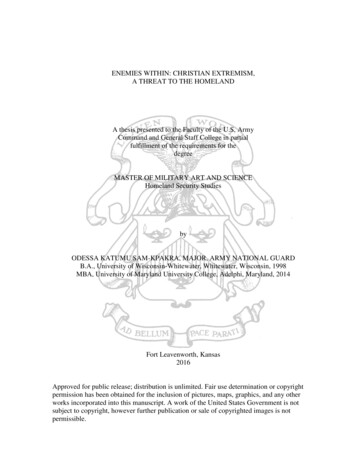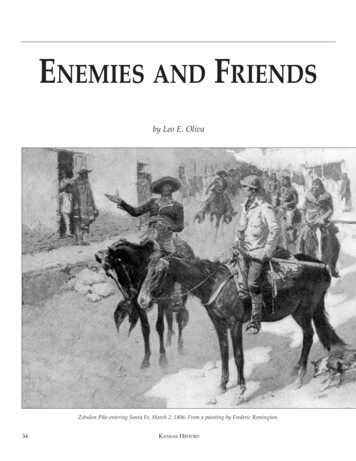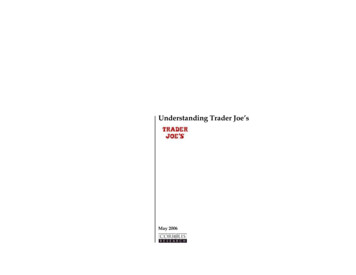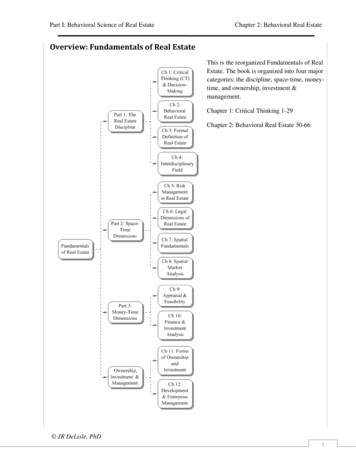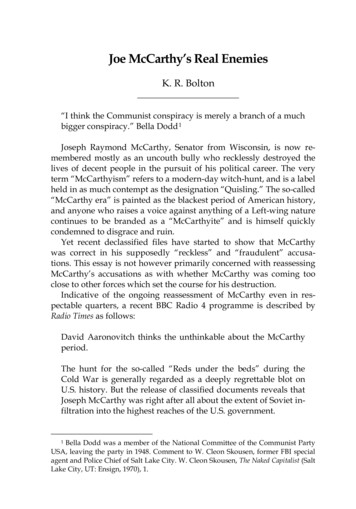
Transcription
Joe McCarthy’s Real EnemiesK. R. Bolton“I think the Communist conspiracy is merely a branch of a muchbigger conspiracy.” Bella Dodd 1Joseph Raymond McCarthy, Senator from Wisconsin, is now remembered mostly as an uncouth bully who recklessly destroyed thelives of decent people in the pursuit of his political career. The veryterm “McCarthyism” refers to a modern-day witch-hunt, and is a labelheld in as much contempt as the designation “Quisling.” The so-called“McCarthy era” is painted as the blackest period of American history,and anyone who raises a voice against anything of a Left-wing naturecontinues to be branded as a “McCarthyite” and is himself quicklycondemned to disgrace and ruin.Yet recent declassified files have started to show that McCarthywas correct in his supposedly “reckless” and “fraudulent” accusations. This essay is not however primarily concerned with reassessingMcCarthy’s accusations as with whether McCarthy was coming tooclose to other forces which set the course for his destruction.Indicative of the ongoing reassessment of McCarthy even in respectable quarters, a recent BBC Radio 4 programme is described byRadio Times as follows:David Aaronovitch thinks the unthinkable about the McCarthyperiod.The hunt for the so-called “Reds under the beds” during theCold War is generally regarded as a deeply regrettable blot onU.S. history. But the release of classified documents reveals thatJoseph McCarthy was right after all about the extent of Soviet infiltration into the highest reaches of the U.S. government.Bella Dodd was a member of the National Committee of the Communist PartyUSA, leaving the party in 1948. Comment to W. Cleon Skousen, former FBI specialagent and Police Chief of Salt Lake City. W. Cleon Skousen, The Naked Capitalist (SaltLake City, UT: Ensign, 1970), 1.1
76The Occidental Quarterly, vol. 10, no. 4, Winter 2010–2011Thanks to the public release of top secret FBI decryptions of Soviet communications, as well as the release under the fifty-yearrule of FBI records and Soviet archives, we now know that theCommunist spying McCarthy fought against was extensive,reaching to the highest level of the State department and theWhite House.We reveal that many of McCarthy's anticommunist investigations were in fact on target. His fears about the effect Soviet infiltration might be having on US foreign policy, particularly in theFar East were also well founded.The decrypts also reveal that people such as [Julius] Rosenberg,Alger Hiss and even Robert Oppenheimer were indeed workingwith the Soviets. We explore why much of this information,available for years to the FBI, was not made public. We also examine how its suppression prevented the prosecution of suspects.Hearing from former FBI, CIA and KGB operatives as well asformerly blacklisted writers, David Aaronovitch, himself from afamily of communists tells the untold story of Soviet influenceand espionage in the United States. 2McCarthy began his investigations against Communist infiltrationwhen on February 9, 1950, he spoke before a Republican Women’sClub in Wheeling, West Virginia, at which he said that there were atleast 57 known Communists in the U.S. State Department, and that theState Department knew it. 3It has been the common charge that McCarthy launched his anticommunist campaign for no other reason than to serve his own political career by whipping up hysteria. Yet other facts show him to havebeen a man of principle regardless of his career: In 1949 McCarthy hadtaken up the cause of German POWs held for allegedly gunning down“McCarthy: There Were Reds Under the Bed.” BBC Radio 4, aired July 25, andAugust 9 2010. http://www.bbc.co.uk/programmes/b00t7hhf3 Scott Speidel, Florida State University, “The Destruction of Joe McCarthy, he-destruction-of-joe-mccarthy/2
Bolton, “Joe McCarthy’s Real Enemies”77American prisoners during the so-called Malmedy Massacre. McCarthy exposed the fact that the Germans had had their POW status revoked so that the Geneva Convention did not protect them, and thatthey were being tortured to extract confessions. Obviously this wasnot the type of cause that was designed to win friends. This had indeed already resulted in McCarthy being condemned by the newsmedia. 4It was the Senate that insisted that McCarthy make his list of 57names of subversives public, although he did not himself think itproper, yet it is McCarthy who has since been damned as the manwho destroyed the innocent by public inquisitions. 5McCarthy’s elimination had been guaranteed, not because he wasgoing after Soviet spies and subversives, but because he was gettingtoo close to the centers of financial and political power.CENSUREThe deathblow to McCarthy’s campaign was instigated not bysome Party hack at the Daily Worker, but by Sen. Ralph E. Flanderswho introduced the resolution for Senate censure of McCarthy. Thiswas backed by Sen. Herbert Lehman, son of Mayer Lehman, founderof Lehman Brothers international investment bank, of which Herbertbecame a partner.In its introduction to its collection of the Lehman Papers, ColumbiaUniversity describes the august Senator Lehman as follows:Having served as Governor of New York State between 1933 and1942, in 1949, at the age of 71 Lehman was elected United StatesSenator to fill the unexpired term of Robert F. Wagner, Sr. Reelected for a full term in 1950, Senator Lehman gave six years ofdistinguished service to the people of his state and nation.His courage, moral integrity and unfaltering dedication soonmade Senator Lehman one of Washington’s most respected senators; just as they had won him affection and honor in New York6Ibid.Ibid. McCarthy was never permitted to make full disclosure of his evidence.That he referred to three separate lists of subversives was distorted by the mediaand portrayed as inconsistency on McCarthy’s part.6 Considering Lehman’s New York constituency, he would have gained its esteem regardless.45
78The Occidental Quarterly, vol. 10, no. 4, Winter 2010–2011and on the world scene. He became known as “the conscience ofthe Senate” as he led those who stood for liberal principles andfor the rights of accused individuals in the early 1950s whenSenator McCarthy’s influence was at its peak. Utterly fearlessand disdainful for his own political fortunes, he fought, at timesalmost alone, against tremendous opposition. 7Stating that Lehman stood fearless and “at times almost alone” isnonsense. It was McCarthy who stood fearless and alone, while Lehman had the full weight of the US Administration up to the presidency, the Washington and Wall Street elites, and the most influential ofthe news media.Columbia University describes the battle between Lehman andMcCarthy as “bitter.” According to Lehman’s biographer, Allen Nevins, on at least one occasion senatorial colleagues feared that the verbal combat between Lehman and McCarthy would lead to blows onthe floor of the Senate. 8Lehman, like the Warburgs and the Schiffs, et al., intermarried withinthe exclusive world of Jewish banking dynasties, marrying Edith LouiseAltschul, the daughter of the head of the New York branch of LazardFreres, the Paris-based banking house. He was awarded the Presidential Medal of Freedom in 1963 for his campaign against Sen. McCarthy, 9 but died on December 5 as he was about to go to the WhiteHouse to receive his reward. Another anti-McCarthy figure, cartoonistHerbert Block, discussed below, was awarded the same honor byPresident Clinton in 1994.Sen. Flanders also had an interesting background, not as some “progressive” or liberal Democrat, but as a Republican, an industrialist and a banker.Under the guise of being an anti-communist, Flanders stated that McCarthywas misdirecting efforts against communism by looking inward, at subversionin the USA, whereas the fight must be directed outward against Soviet expan-Columbia University Libraries, Rare Book and Manuscript Library, “Materialsfor the Study of McCarthyism at the Herbert H. Lehman Suite and ml/units/lehman/guides/mccarthyism.html8 Allan Nevins, Herbert H. Lehman and His Era (New York: Scribner, 1963).9 “Herbert Henry Lehman,” Jewish Virtual Library.http://74.125.155.132/search?q ource/biography/lehman.html7
Bolton, “Joe McCarthy’s Real Enemies”79sion.10 This line fitted entirely with that of the US Establishment: Ever since Stalin foiled the US attempt to create a “new world order” immediately afterWorld War II via the United Nations and the “Baruch Plan” for the internationalization of atomic energy — both measures which, in the opinion of the Soviets, would have assured US global hegemony, the wartime US-Soviet accordhad been replaced by a Cold War.11 The US Establishment sought to recruitinfluential anti-Soviet Leftists, whom the CIA depicted as “anti-communists.”This ideological offensive was undertaken by the CIA, with backing fromwealthy and influential elites, in particular the Rockefellers, primarily underthe banner of the Congress for Cultural Freedom, led by pro-Trotsky “Menshevik” intellectual Prof. Sidney Hook, another recipient of the PresidentialMedal of Freedom.12McCarthy’s most dangerous enemies were, in this writer’s opinion, not theSoviet spies and American Communist Party functionaries he was exposing,but those whom he had not even yet targeted, the power elite and their agents.Flanders had been president of the Boston Federal Reserve Bank for twoyears prior to being elected Senator for Vermont. In 1942 he was appointed tothe Committee for Economic Development, which was established to formulate US post-war economic policy, including the role of the World Bank and theInternational Monetary Fund. 13When Flanders introduced his resolution of censure against McCarthy, Timereported:From outside the Senate, Flanders won the support of a group of23 top businessmen, labor leaders and educators, e.g., PublisherJohn Cowles (Des Moines Register & Tribune), Movie ProducerSamuel Goldwyn, Financier Lewis W. Douglas (chairman, Mutual Life of New York). They wired every U.S. Senator (exceptMcCarthy himself) urging a favorable vote “to curb the flagrantabuse of power by Senator McCarthy.”1410 Ralph E. Flanders, “Activities of Senator McCarthy—The World Crisis.” Congressional Record—Proceedings and Debates of the 83rd Congress, Second Session (Washington, DC: U.S. Government Printing Office), March 9, 1954.11 K. R. Bolton, “Origins of the Cold War: How Stalin Foiled a ‘New World Order,’ Relevance for the Present,” Foreign Policy Journal, June 1, 2010,http://www.foreignpolicyjournal.com/12 Frances Stonor Saunders, The Cultural Cold War: The CIA and the World of Artsand Letters (New York: The New Press, 2000).13 Ralph E Flanders, Senator from Vermont (Boston: Little, Brown, 1961), 179-180.14 Time, National Affairs: “The Dispensable Man,” August 2, 1954.
80The Occidental Quarterly, vol. 10, no. 4, Winter 2010–2011Note the line-up against McCarthy was that of the Left combined with bigbusiness and capital, precisely the nexus that any student of the inner workingsof history and politics would expect. Flanders’ resolution read:Resolved, that the conduct of the Senator from Wisconsin . isunbecoming a member of the United States Senate, is contrary tosenatorial traditions, and tends to bring the Senate into disrepute, and such conduct is hereby condemned.Keep in mind at this stage that both Flanders and Lehman 15 weremembers of the Council on Foreign Relations, which CFR official historian Peter Grosse described as “the US foreign policy establishment.” 16 Flanders had been involved in a CFR study committee onpost-war US foreign policy set up in 1940. Flanders was also a member of the Business Advisory Council, another association of significance that will be considered shortly.Other CFR study group members included Lauchlin Currie 17 andBenjamin V. Cohen, both from the US State Department, Asia expertProf. Owen Lattimore, 18 and economist Leo Pasvolsky, special assistant for post-war planning to the US Secretary of State. 19 All of theseCFR advisers were to come to the attention of Sen. McCarthy’s investigations into subversion.This CFR connection is a primary key to understanding McCarthy’spolitical destruction, as will be considered below.When a Senate committee voted for censure, Time magazine enthused that the Senate had regained the “dignity” intended by theFounding Fathers:Peter Gross, Continuing the Inquiry, “Basic Assumptions.” (New York: Councilon Foreign Relations. ions.html16 Ibid.17 Joseph R McCarthy, America’s Retreat from Victory: The Story of George CatlettMarshall (Boston: Western Islands, 1965), 57. Originally published by Devin-Adair,1951. This book by McCarthy on how China was delivered to Mao via the USA is anexample of how McCarthy’s arguments were meticulously documented.18 Laurence H Shoup and William Minter, Imperial Brain Trust: The Council on Foreign Relations and the United States Foreign Policy (Lincoln, NE: Authors Choice Press,1977), 120-121.19 Ibid., 124.15
Bolton, “Joe McCarthy’s Real Enemies”81When the constitutional foundation of the U.S. Senate was builtin 1787, the builders believed they were constructing a citadel ofdeliberation and dignity. Said James Madison: "The use of theSenate is to consist in its proceeding with more coolness, withmore system, and with more wisdom than the popular branch."One hundred and sixty-seven years later, when the floodlightsblazed on the Army-McCarthy hearings, wisdom, system andcoolness seemed to have vanished in the glare. But this week,out of a tidy office on the fourth floor of the Senate Office Building, came a ringing reassertion of the U.S. Senate's dignity.A Select Committee of the Senate recommended the censure ofWisconsin's Senator Joseph R. McCarthy, and thereby erected anew landmark in U.S. government. The report was carefullyconstructed by six shirtsleeved men in the office of Utah's Senator Arthur Vivian Watkins, a man little known in the past whoshould be long remembered in the future. Unanimously, firmly,unequivocally. 20Of course Time presented the Watkins committee as consisting ofthe heroic and the fearless, rather than as typical careerists who hadthe backing of most of the Senate up to the presidency, and what cangenerically be called the “US Establishment.” It is notable that of thedozens of counts that were originally levelled against McCarthy, aftermuch deliberation the stalwart six found only two counts they feltconfident they could make stick: McCarthy’s reaction to an investigation on electioneering in 1951–52, which comprised an allegation subsequently found to be without merit; and McCarthy’s “inexcusable”and “reprehensible” manner before Brig. Gen. Ralph Zwicker at theMcCarthy-Army hearing into communist influence in the military.The Watkins’ committee based its censure of McCarthy’s on his robustreaction to the attempted 1951 impugning of his character (even then)in regard to an investigation of funding. He reacted by characterizingthe investigation itself as dishonest, and he described one senator, Robert C. Hendrickson (R–New Jersey), as having “neither guts norbrains.” The Watkins’ committee sought to censure McCarthy becausein 1952 he had impugned a senator’s character, which surely amountsto arrant humbug and hypocrisy on the part of the committee and all20“The Censure of Joe McCarthy,” Time (October 4, 1954).
82The Occidental Quarterly, vol. 10, no. 4, Winter 2010–2011who voted for the censure of McCarthy considering the years of abusehe had ensured.The Times reporting on the second count (regarding McCarthy’squestioning of Brig. Gen. Zwicker) states that the Watkins’ committeecondemned McCarthy for having stated to Zwicker that he was not fitto wear a uniform, and should be removed from command. The controversy concerned McCarthy’s investigation of the circumstancesaround the promotion of Maj. Irving Peress and his honourable discharge, even though he had refused to sign loyalty forms. Zwickerhad refused to answer McCarthy’s questions on the matter, andMcCarthy responded by not having the deference towards the General which was apparently expected of him. In condemning McCarthy’sattitude, the Watkins committee stated that McCarthy knew thatZwicker had been “ordered by a higher authority” to issue the honorable discharge, which one might conjecture was the real problem:McCarthy’s having gotten too close to “higher authorities.”Yet Time reported on the antics of Sen. Flanders in its analysis of theWatkins committee deliberations as being completely fair and charitable towards McCarthy, saying of Flanders:Careful Reasoning. When it [the Watkins committee] consideredthe charge that McCarthy had unfairly attacked Vermont's Senator Flanders, the committee made another careful distinction.McCarthy's comment on Flanders had been brutal; “I think theyshould get a man with a net and take him to a good, quietplace.” But this was an attack on an individual senator, becausehe had made “provocative speeches” about McCarthy on the Senate floor and had marched into a televised session of the ArmyMcCarthy hearings to serve notice that he was about to makeanother one. It was not an attack on a Senator for an official action he had taken as a member of a committee, as in the Hendrickson case. While McCarthy's remarks were “highly improper,” the committee ruled that the circumstances did not justify arecommendation for censure. 21Time, presumably unwittingly, depicts the atmosphere surroundingthe “McCarthy era” and the picture emerges that it was McCarthywho was subjected to the abuse and theatrics of the type his detractors21Ibid.
Bolton, “Joe McCarthy’s Real Enemies”83have continued to project onto him down to the present. One wonderswhether the supposed “charity” the Watkins committee was bestowing upon McCarthy was in fact motivated by the flimsiness of theirown position. Why hadn’t Flanders been censured for what theWatkins committee itself conceded was Flanders’ “provocativespeeches” against McCarthy in the Senate? Why wasn’t Flanders censured for his attempts to disrupt the hearings of McCarthy’s investigations? Double-standards were being applied against McCarthy, thehypocrisy of which is compounded by the double-standards beingcalled “charitable.”As events transpired, soon after the Time report, the Watkin’scommittee censure dropped the count of McCarthy’s having been disrespectful to Zwicker, since there was contention as to Zwicker’s ownattitude towards McCarthy.22SOVIET AGENTS OR SCIONS OF THE SYSTEM?The primary contention of this article is that the individuals and associations that McCarthy was going after were not Soviet agents somuch as Establishment scions. Hence when McCarthy attacked USpolicy in China as favouring the Maoists,23 it was assumed that theinterests being served were those of the USSR. It has more recentlybeen confirmed that McCarthy was correct in pointing the finger atFar Eastern advisers such as Prof. Owen Lattimore and others of theInstitute on Pacific Relations. However the policy that was being pursued was on behalf of the American plutocratic cabal, while Stalin didhis best to resist a communist takeover and indeed backed Chiangright up until the General’s final defeat. 24 Instead the Watkin’s committee substituted as the second count that McCarthy had been disrespectful to their own committee! Of the dozens of original countsthe Senators’ sought to use on the Senate Floor to censure McCarthy,they were only left with one original count — that McCarthy severalyears previously had refused to co-operate with the Gillette committee investigating financial irregularities. The investigation of McCarthy had been in reaction to the Senator’s condemnation of Secretary ofState George C Marshall for his having supported the recall of Gen.Medford Evans, The [Political] Assassination of Joe McCarthy (Boston: WesternIsland, 1970), 243.23 McCarthy, America’s Retreat From Victory.24 Jung Chang and Jon Halliday, Mao: The Unknown Story (London: JonathanCape, 1970), 304–311.22
84The Occidental Quarterly, vol. 10, no. 4, Winter 2010–2011Douglas McArthur who had wanted to press for victory in Korea. Sen.William Benton (D., Conn.), instigated the creation of the Gillette Subcommittee on Privileges to enquire as to why McCarthy had not cooperated with the Tydings committee into finances. The committee wasineffectual in its efforts to get McCarthy.What did McCarthy in was his getting too close to the real powercenters of the USA. The eminent American historian Prof. CarrollQuigley of Harvard, acknowledged by President Clinton as his academic mentor, wrote of an international “network” controlled by international bankers, which seeks to establish a system of world political and economic control. Quigley was primarily referring the Councilon Foreign Relations and its offshoots, and claimed inside knowledge,having been permitted in the 1960s to examine its papers andrecords. 25 Although Quigley only writes of this “network” in a scantdozen or so pages in his more than 1300 page magnum opus Tragedyand Hope, which he used as a text for his Harvard courses, this wassufficient to suddenly bring Quigley’s long and distinguished careerto an abrupt halt, despite his impeccable credentials and an Establishment liberal-internationalist. 26Quigley does however provide much clarity on the origins of thereal power that McCarthy and others were up against in supposingthat they were simply fighting Communism and Soviet espionage.Quigley explained: “It is this power structure which the Radical Rightin the US has been attacking for years in the belief that they were attacking the Communists.”It must be recognized that the power that these energetic Left-wingers exercised was never their own power nor communist power but ultimately the power of the international financial coteries, and oncethe anger and suspicions of the American people were aroused, as theywere by 1950, it was a fairly simple matter to get rid of the Red sympathisers. Before this could be done, however, a congressional committee followed backward to their sources the threads which led from admittedCommunists like Whitaker Chambers, through Alger Hiss, andthe Carnegie Endowment to Thomas Lamont and the MorganBank, fell into the whole complicated network of tax exemptCarroll Quigley, Tragedy & Hope (New York: MacMillan Company, 1966), 950.Robert Eringer, The Global Manipulators (Bristol: Pentacle Books, 1980), 9.Comments by Quigley to Eringer.2526
Bolton, “Joe McCarthy’s Real Enemies”85foundations. The Eighty-third Congress in July 1953 set up aSpecial Committee to Investigate Tax-Exempt Foundations . Itsoon became clear that people of immense wealth would be unhappy if the investigation went too far and that the “most respected” newspapers in the country, closely allied with these menof wealth, would not be excited enough about any revelations tomake the publicity worthwhile, in terms of votes or campaigncontributions. 27 (emphasis added)One such example of the power of the “international financial coteries” mistaken as communist influence, was the aforementioned Institute of Pacific Relations (IPR), which was held responsible for pushingChina toward communism by a 1951 Subcommittee on Internal Security under Sen. Pat McCarran. Quigley commented on this: “The influence of the communists in IPR is well established, but the patronage of Wall Street is less well known.” 28 He goes on to state that thefinancial backing for the IPR came from Rockefeller and J P Moragninterests, from Standard Oil, ITT, International General Electric, National City Bank, Chase Manhattan Bank, etc.COUNCIL ON FOREIGN RELATIONSMuch of the influence of the “network” referred to by Quigley on US Administrations is exercised by the Council on Foreign Relations (CFR), established in 1921 by President Wilson’s chief adviser Edward Mandel House outof a previous think tank called The Inquiry, formed in 1917–1918 to advisePres. Wilson on the Paris Peace Conference of 1919, and another group ofbankers and academics that had already been named the Council on ForeignRelations. CFR historian Grosse writes of the CFR in regard to the “McCarthyera”:Concerns that seemed more pressing bore down at the turn ofthe 1950s. The nation was in danger of succumbing to a redbaiting frenzy, marked by the rise into the headlines of SenatorJoseph R. McCarthy. Not surprisingly, the Council’s membership seemed solidly united in contempt for the Wisconsin demagogue; under his provocative rhetoric, after all, was a thinlyveiled attack on the entire East Coast foreign policy establish2728Quigley, Tragedy & Hope, 954–955.Ibid., 946.
86The Occidental Quarterly, vol. 10, no. 4, Winter 2010–2011ment, whose members gathered regularly in the closed conference rooms of the Harold Pratt House. 29Here Grosse is saying in an official CFR history that:1. The entire “network” was “solidly united against” McCarthy in whathe saw as nothing other than a fight against communism and Sovietinfluence;2. That what McCarthy thought was communism and Soviet infiltrationwas actually the “entire East Coast foreign policy establishment” centred on the CFR.While a large proportion of the subversives McCarthy was turning the nation’s attention to were CFR members such as Owen Lattimore, Lauchlin Currie, et al., there were three individuals in particular who were too wellconnected to the US Establishment for McCarthy to be allowed to continue. Hewas unwittingly too close to the centre of the US power structure. These individuals were Cord Meyer, John J. McCloy and Robert T. Stevens.Robert T. Stevens was Secretary of the Army at a time whenMcCarthy was involved in his final campaign before he was silenced— an investigation into communist activities in the military. Stevensof J. P. Stevens & Co., Charles E. Wilson of General Motors as Secretary of Defense, and George M. Humphrey of M. A. Hanna Co., asTreasury Secretary had been elevated to these posts after a meetingbetween Pres. Eisenhower, international banker Sidney Weinberg, andGen. Lucius Clay. Those involved were members of the Business Advisory Council (BAC), Weinberg and Clay being on the executivecommittee.The BAC had been formed in 1933 to advise Pres. Roosevelt on businessmatters, just as the CFR advised on foreign policy. The BAC was the brainchildof Sidney Weinberg of Goldman, Sachs & Co., who recruited most of the keymembers.30 In September 1960 Harper’s Magazine published an expose of thePeter Grosse, Continuing the Inquiry, “X Leads the Way.”http://www.cfr.org/about/history/cfr/x leads.html30 Dan Smoot, The Invisible Government (Dallas: The Dan Smoot Report, 1964), 81.Smoot, a former Harvard professor joined the FBI as a special agent. His book is oneof the first exposing the CFR, and is meticulously researched.29
Bolton, “Joe McCarthy’s Real Enemies”87BAC, which it described as “America’s most powerful private club.”31 The article includes some pertinent insights into the forces that destroyed McCarthy:The Business Advisory Council meets regularly with government officials six times a year. On two of these six occasions .the BAC convenes its sessions at plush resorts, and with a halfdozen or more important Washington officials and their wives asits guests, it indulges in a three-day ‘work and play’ meeting.The guest list is always impressive: on occasion, there have beenmore Cabinet officers at a . BAC meeting than were left in theCapital.After the 1952 election, the BAC was having its fall ‘work andplay’ meeting at the Cloister, just off the Georgia coast and ashort distance from Augusta, where Ike [President Eisenhower]was alternating golf with planning his first-term Cabinet. [Sidney] Weinberg and [General Lucius D.] Clay [members of theBAC executive committee] hustled to Augusta, conferred withIke [a “close, intimate, personal friend” of both men].The result was historic: Ike tapped three of the BAC leaders .for his Cabinet. They were Charles E. Wilson of General Motorsas Defense Secretary; [George M.] Humphrey, then boss of theM. A. Hanna Co., as Treasury Secretary; and Robert T. Stevens ofthe J. P. Stevens & Co., as Army Secretary.The BAC, powerful in its composition and with an inside track,is thus a special force. An intimation of its influence can begleaned from its role in the McCarthy case. BAC helped pushSenator Joe McCarthy over the brink in 1954, by supplying a bitof backbone to the Eisenhower Administration at the right time.McCarthy’s chief target in the Army-McCarthy hearings was theaforementioned Robert T. Stevens — a big wheel in the BACwho had become Secretary of the Army. The BAC didn't payHobart Rowan, “America’s Most Powerful Private Club: How a semi-social organization of the very biggest businessmen — discretely shielded from public scrutiny — is ‘advising’ the government on its top policy decisions,” Harper’s Magazine(September 1960, 79–84).31
88The Occidental Quarterly, vol. 10, no. 4, Winter 2010–2011much — if any — attention to Joe McCarthy as a social menaceuntil he started to pick on Bob Stevens. Then, they burned up.During the May 1954 meeting at the Homestead [expensiveresort hotel in Hot Springs, Virginia, where the BAC often holdsits 'work and play' sessions with high government officials andtheir wives], Stevens flew down from Washington for a weekendreprieve from his televised torture. A special delegation of BACofficials made it a point to journey from the hotel to the mountaintop airport to greet Stevens. He was escorted into the lobbylike a conquering hero. Then, publicly, one member of the BACafter another roasted the Eisenhower Administration for itsMcCarthy-appeasement policy. The BAC’s attitude gave theAdministration some co
Joe McCarthy’s Real Enemies K. R. Bolton _ “I think the Communist conspiracy is merely a branch of a much . family of communists tells the untold story of Soviet influence and espionage in the United States.2 . not the type of cause that was designed to win friends. This had in

